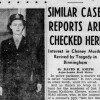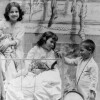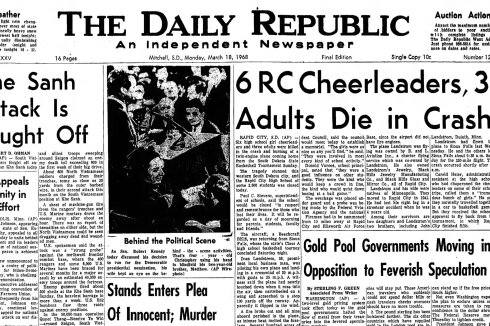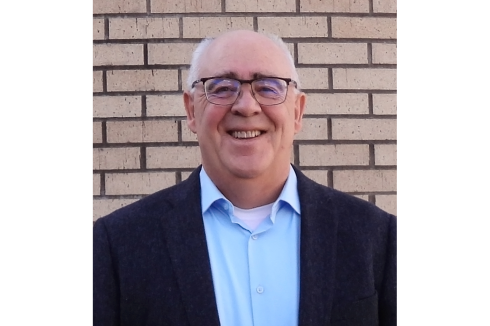Editor's note: This story is part two of a five-part series examining the Plymouth Brethren Christian Church, its beliefs, practices and its role in the North Dakota town of Neche, population 344.
NECHE, N.D. — After more than 20 years away from her hometown of Neche, North Dakota, Carman Drever discreetly backed her car into a friend’s driveway in the town so passersby from the Plymouth Brethren Christian Church, an isolated religion whose members dominate the town, would not see her out-of-state Kentucky license plate.
ADVERTISEMENT
Despite her caution, she was spotted. Being of “royal blood,” granddaughter of a former universal leader who ruled the Brethren world in Neche from 1970 to 1987, she knew they’d find her. Throughout the day, as she sat with Forum News Service for interviews at the town’s Pioneer Park, members of the Brethren stopped their pickup trucks nearby to watch.
When a red pickup passed by, Drever turned her head to look. It was her uncle. She hadn’t seen him since before her excommunication, or in Brethren terms, “withdrawn from” — separated from everything she grew up with, family, church, friends and property.
“They look so miserable, you know? Like they’re in a thundercloud bent over the steering wheel. I’m like, really? If you were the chosen people, you should be the happiest people,” said Drever, alluding to the Brethren belief that they are God’s favorites.

Drever left the Brethren in 2004, eight years after she moved with her family from Neche to Maple Creek, in Saskatchewan, Canada. While there, she began to realize that she belonged to an organization that sought to control every aspect of her family’s life. To her, it was a cult.
Forum News Service conducted interviews with 25 people, including members and 13 former members, to better understand the Plymouth Brethren and its role in Neche, a town of 344 on the Canadian border.
Those interviews aligned closely with Drever’s experiences, revealing how the Brethren controls its 54,000 members worldwide through what former members describe as “Three Fs: fear, family and finances.” From the cradle to the grave, they say, nearly every aspect of group members’ lives are manipulated and controlled.
Promoting feelings of guilt, instilling fear and phobia indoctrination are all aspects that lend credence to claims that the Brethren is a cult — as outlined by cultic expert Steven Hassan’s BITE Model of Authoritarian Control — a four-part checklist on how cults recruit and maintain control over members’ behavior, thoughts, information and emotions.
ADVERTISEMENT
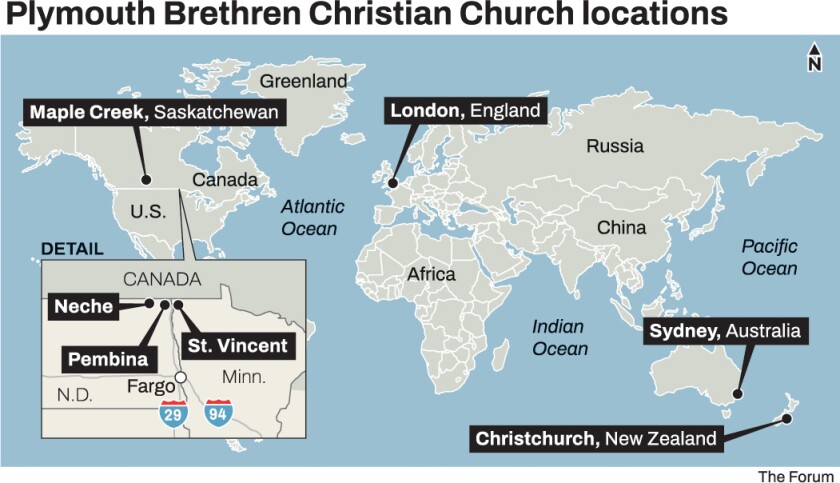
Stephen Kent, a retired university professor from Alberta, Canada, and an expert in alternative religions, said he is familiar with the Brethren, which he called the Exclusive Brethren.
“The study of these controversial groups is controversial,” Kent said, adding that some are sympathetic and others, like him, stop short of calling the Brethren a cult.
“They do the greatest harm to their members and former members and impose minimal harm to the outside,” Kent said.
“And people on the inside cannot question the edicts from leadership. If a leader is considered to be a man of God then what that person says is absolute truth and any deviation from it can lead to severe punishment including shunning,” said Kent.
Despite multiple efforts, Forum News Service was denied face-to-face interviews with Brethren leaders or entry to its Neche meeting hall. A Brethren representative did respond to emailed questions.
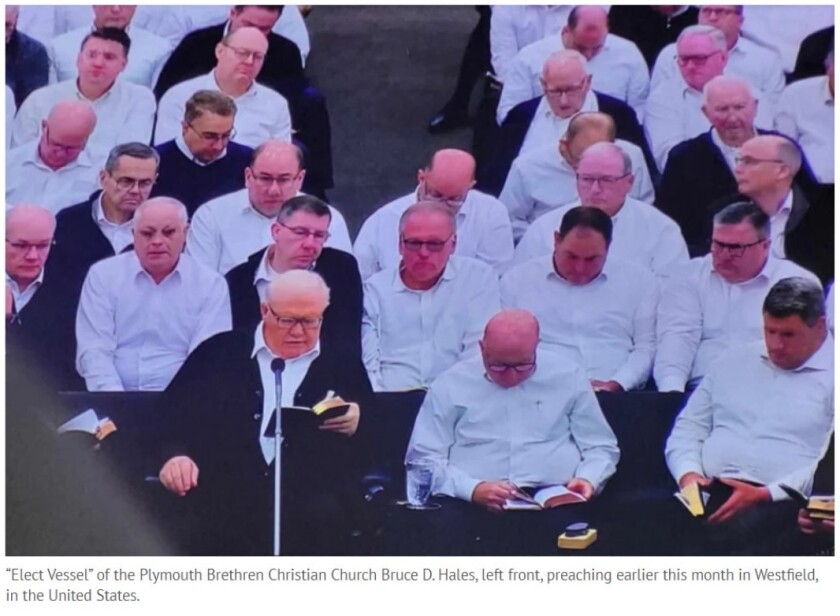
The fear
Among the three “Fs” — fear, family and finance — the first F is the fear of loss, the outside world and eternal damnation, all of which are emotions that former members claim are rampant among Brethren communities, called localities by members.
ADVERTISEMENT
Such fears are groomed into Brethren members across the world, former members say, adding that they’re taught how to act, how to think, what to wear, what to drink and how to hate by the sect’s “universal leader” — always a man. His directions are inspired gospel; to disobey is to be disloyal.
In 2006, a group of Brethren churches in the UK lost their charitable status, which affected their meeting rooms across the country. Although their status was eventually reinstated, investigators with the House of Commons Public Administration Select Committee defined the role of the Brethren’s leader during a lengthy debate.
“This international leader is known variously as ‘the man of God’ and the ‘Paul of our day’ and his word is obeyed to the letter. He is given ‘gifts’ of thousands of pounds/dollars from meetings around the world, and is deferred to in every facet of the lives of his adherents,” the House of Commons reported.
In a September 2023 business conference speech obtained by Forum News Service, a Brethren member named Richard Lynes said the Brethren’s universal leaders, or “great men,” should be elevated and you would gain “great [favor] if these men knew your name. (It) Is like having your name written in the Book of Life.”
For further proof of the universal leader’s control, Drever pointed to speeches made — published in booklet form, and obtained by Forum News Service — by Hales, at a 2014 seminar in Westfield, New Jersey, where he told members they must surrender unconditionally to his authority.
“Let every soul be subject to the authorities that are above him. For there is no authority except from God; and those that exist are set up by God. So that passage refers to the area of God’s direct government in the assembly (Brethren), and then also his area of indirect government; that would be government that exists in the world,” Hales said.
“I’ve seen ministry where Bruce has put himself in the place of Christ. And that, to me, is one of the scariest parts of the whole system, “ Drever said. “When you start to take the place of Christ, and you’re drawing people to you instead of leading them and ministering them to go to Christ, I had a huge issue with that. I think it’s extremely dangerous and it’s the exact definition of a cult.”
ADVERTISEMENT
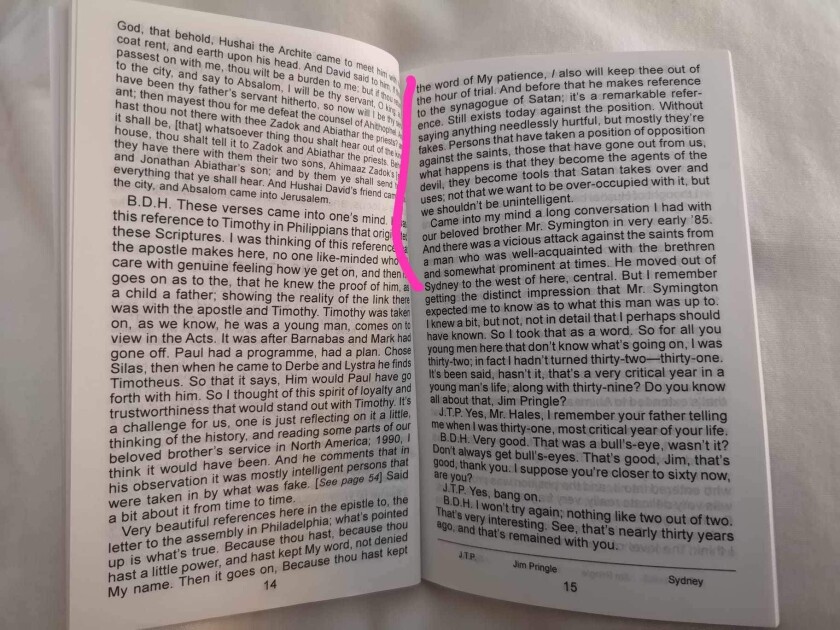
A spokesperson for the Brethren said they have a non-hierarchical structure and no formal appointments to any position.
“We do recognize ‘elders’ who provide leadership and pastoral care for the congregation,” the spokesperson said.
Carl Symington, a farmer near Pembina, North Dakota, spoke with Forum News Service. He said he knows Bruce D. Hales, the Brethren’s universal leader, personally.
“I’ve met him many times and he has never told me what to do,” Symington said. “He is like if I had an older uncle to be counted on and to check in with me. We don’t consider ourselves a hierarchy; we are more like a family.”
When asked whether some people’s claims are true that Hales is put on a pedestal similar to Jesus Christ, Symington shook his head.
“I don’t agree with that at all, putting Bruce on a pedestal. Christ took the place of a servant, and that’s the place our leader takes. He’s trying to serve,” Symington said.
But former members claim the universal leader and his family are often referred to as “royalty” or the “royal family.”
ADVERTISEMENT
Former Brethren member Richard Marsh, who is from the UK and now lives in Canada, said the leader’s role has long been established, including under Drever’s grandfather, James H. Symington, universal leader from 1970 to 1987.
“It’s trained into you from birth that the man of god is sacred. My mother would not say what would Jesus do, she would say ‘What would Mr. Symington do?’”
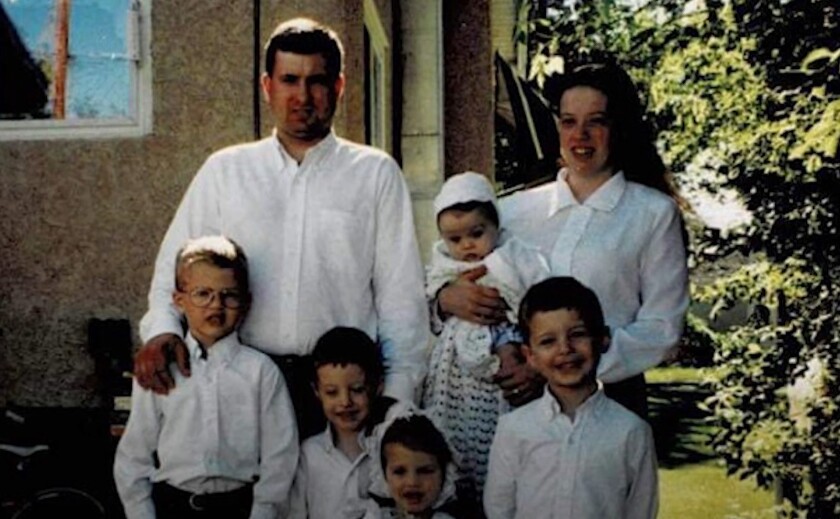
The family
The second “F” is family, which the Brethren uses to control someone who strays from their teachings, or as leverage to keep people in line, Drever said.
Drever’s departure from the Brethren began when she questioned decisions made in Maple Creek, where she lived in Canada. She discovered children and teenagers were being excommunicated — separated from their parents and siblings — for swearing or stepping on a Bible.
“We watched 18 kids literally get ‘thrown out’ (of the Brethren). Maple Creek is a very harsh country. It is Saskatchewan. It’s cowboy country. They lost a lot of young people just due to accidents, and now they had 18 more deaths, really, because these are people that are taken out of families,” Drever said.
“It’s literally like the death of a child, and watching these mothers go through this, and I’m sitting there with my five little kids looking around … thinking, ‘This is wrong,’” Drever said.
ADVERTISEMENT
Marsh, the former Brethren member, explained the process of excommunication. The first step is to be “shut up,” which means banned from church meetings and isolated from family and friends, like solitary confinement. A ban has no time limit, and could lead to the final step of being “withdrawn from,” or excommunicated, which can result in divorce and complete isolation from family.
“To a brainwashed mind that believes they are the chosen ones with a special place in heaven means sheer terror,” Marsh said. “If you’re kicked out of the Brethren, your life is over. Lost. Satan has taken over your life.”
Drever took her concerns to the Brethren’s then-universal leader, John S. Hales (father of the current leader, Bruce D. Hales), with her discovery about excommunication of children, which angered local leadership in Maple Creek. For the next few years, every day, she was denounced before the congregation. Being a woman, she was not allowed to speak out in her own defense, Drever said.

“Every night, it was a different one. I was the pillar of salt,” said Drever, referring to Lot’s wife, who, according to the Bible, turned into a pillar of salt for disobeying God. “I was, I mean, every naughty lady in the Bible. I was her.”
After one particularly heinous berating, she stepped outside the meeting hall, or church, with her husband.
“It was raining outside. I remember sticking my arms up and I said, ‘Do you see those drops sizzling? I’m not a pillar of salt,’” Drever said.
Soon after the “pillar of salt” meeting, Drever and her family left their house, their business, and moved to Winnipeg, but the abuse followed them there. The principal of the public school her children attended — which enrolled Brethren children at the time — called her into the office.
“She said, ‘Do you realize your children are being bullied? I’m not talking about just ordinary bullying because we deal with that on a classroom level. I’m talking about your kids being singled out, being hit, physically punched, being provoked, being name called,’” Drever recalls the principal telling her.
“I remember looking at my husband and saying, ‘I can’t, I can’t do this. I cannot raise five kids knowing that their mother — who is a little feisty — is eventually going to say something that is going to get them into trouble,” Drever said.
Not long after, Drever, her husband and five children left the Brethren and moved south to Kentucky. Her family was excommunicated, but she considers their escape lucky, as many families end up split and broken.

Judy Symington Harlow, a former Brethren member who left when she was 20, married an “outsider” shortly after she left the group. She had no one to walk her down the aisle.
“I had the family I married into, but none for myself. I knew that none of my family would come. My mom, she was black and white and never, never talked to me again,” Harlow said.
“I think that if I had married in (the Brethren) and had to take my family out, I would have struggled with that a lot because families that have done that leave some of them in and some of them out,” Harlow said. “It’s a mess, so, so tragic and so, so sad.”
The Brethren has left a trail of broken families because of a separation doctrine that the sect adopted in the 1960s as a means to control people from leaving, said Drever.
“It means, if you don’t go to the breaking of bread with these people, you can’t live with them. You can’t eat with them. You can’t talk to them. It is like this harsh, physical separation that they brought in, and that is when they started to separate husbands and wives,” she said.
The doctrine of separation is so unbending that when Drever’s youngest brother — who delivered the Grand Forks Herald newspaper at the time — was excommunicated, all Brethren members in Neche were ordered to cancel their subscriptions to avoid corruption and contamination.
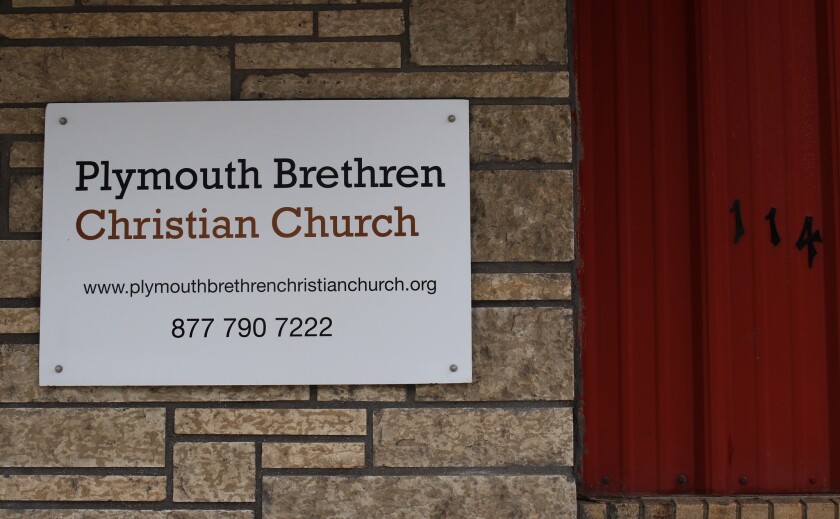
The Brethren spokesperson rejected the characterization of excommunication by many former members. He told Forum News Service isolation practices are “family decisions. Our church does not make determinations on which family members should stay in contact with each other and in which circumstances.”
The spokesperson said there is “no truth to these claims” that the Brethren rules its members by fear, and the basis for fellowship is a weekly “Lord’s supper,” or Sunday communion together. Meetings are also held daily either in meeting rooms or online over Zoom.
“This does not mean that we hold ourselves as superior to our fellow men, women and children. We live and work harmoniously alongside them, in the mainstream of society,” the spokesperson said.
“Our practice of separation does not preclude interaction in the broader community. We help our neighbors and they help us,” the spokesperson said.
Carl Symington, the current Brethren member, said he is aware of stories of separation from former members.
“But they can always come back,” Symington said. “We just want to live a simpler life. There’s not even a local person that tells me what to do. And it doesn’t matter which denomination you are from, you come and ask for help, we will help,” Symington said.
Stephen Kent, the retired Canadian professor considered an expert on alternative religions, stopped short from calling the Brethren a cult, but said the Brethren’s separation doctrine violates international law accepted by the United Nations General Assembly in 1948.
“Splitting families and denying parents access to their children is an international violation of the rights of the child. Even for adults, Article 12 of the Universal Declaration of Human Rights says, ‘No one shall be subjected to arbitrary interference with his privacy, family, home or correspondence, nor to attacks upon his [honor] and reputation. Everyone has the right to the protection of the law against such interference or attacks,’” Kent said.
“Critics might bring up the use of church-funded custody battles that make disfellowshipped parents unable to utilize the legal system because of the costs. So, both adults and children have their human rights violated,” Kent said.

The finances
The third “F” is members’ finances, which are intertwined in the Brethren’s ecosystem. According to former members, if a person leaves the Brethren, they lose their house, job, bank accounts, and more.
When they were excommunicated, Drever’s family lost their farming tool business plus all their investments in the family farm, their house and extended family members, most of whom they have not seen in 22 years.
As control continues to tighten within the Brethren, the fear of losing all earthly possessions is more real than it was when Drever left, she said.
Young people live with their parents before marriage. They’re required to work for a Brethren-linked company, and employers control how portions of their money are spent, Drever said.
Members are expected to tithe — give 10% of their income to the church — and anyone who doesn’t comply is shunned, Drever said.
“The increase in entanglements rolled out by the Hales regime (the Brethren’s leader and his family) has made it almost an impossible mission to leave the group now,” Drever said.
The control over Brethren finances starts on the walls, which are meant to be sparse and clean, with only approved decorations, Drever said.
Everyone is encouraged — which in Brethren terminology means dictated by the universal leader Bruce D. Hales — to purchase items like a canvas painting of the “seven great leaders,” depicting the church’s first leader, John Nelson Darby, to the current leader, Hales. Cost: $350 to $450.

Other aspects of daily living, such as a cell phone or a computer for business, is also tightly restricted and are to be purchased from the Universal Business Team, or UBT, which is a company run by Brethren members that offers services to about 3,000 Brethren-linked businesses.
An older Samsung S23 phone costs $1,625 on the Brethren website, and $759 on Samsung’s website. Microsoft Office Professional 2016 on the UBT website costs $587, while on other legitimate websites the program costs less than $30.
Although organizations like the Universal Business Team, or UBT, which was recently raided by the Australian Tax Office, is not technically part of the church, companies like UBT work in the church’s interests providing services to about 3,000 Brethren-owned companies in 19 countries.

A spokesperson for the Brethren also told Forum News Service there is a distinct separation between church and business, and that the church does not employ anyone.
Former members describe UBT as the Brethren’s financial arm. Last year, according to a screenshot of the UBT website, the company described itself as being owned by the Brethren. Later, they reported it is a global consultancy group providing services to Brethren-owned businesses with a combined revenue of more than $12.6 billion (New Zealand dollars).
Adam Speed, head of communications for UBT America, told Forum News Service that he investigated the screenshot and that it was an error on the website. “To confirm, UBT has never been owned by the PBCC at any time,” Speed said, declining to comment on other related questions.
The Brethren also has no legal, financial or other interests in businesses controlled by the group’s members, another Brethren spokesperson told Forum News Service.
“In addition, our partners such as UBT are not owned and operated by the church," the spokesperson said. "Instead, they have been set up and are run by church members for the benefit of other church members and non-members."




